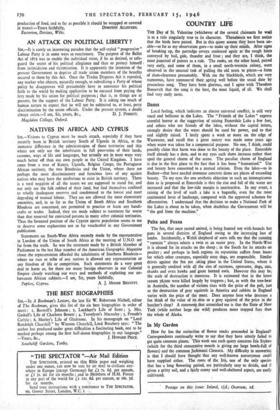NATIVES IN AFRICA AND CYPRUS
SIR,—Visitors to Cyprus must be much strpck, especially if they have recently been in British territory South of Uganda in Africa, at the immense difference in the administrakion of those territories and this where not only are the inhabitants in full possession of their lands, customs, ways of life and languages, but actually are in most ways very much better off than oui own people in the United Kingdom. I have come from a tour of Kenya, Uganda, Belgian Congo, the Portuguese African territory, the two Rnodesias and the Union, where there are perhaps the most discriminatory and ferocious laws of any against natives who may have the misfortune to exist in British territory. There is a total negation of all the tenets we are supposed to stand for, and not only are the folk robbed of their land, but find themselves confined to wholly inadequate reserves and condemned to the lowest and most degrading of manual labour. They are not allowed the most elementary amenities, and, in so far as the Union of South Africa and Southern Rhodesia are concerned, not permitted to practise or learn any handi- crafts or trades Indeed, they are made subject to treatment far worse than that reserved for convicted persons in many other colonial territories. Thus the favoured position of the Cypriot native population seems to me to deserve some explanation not so far vouchsafed in any Government publication.
Statements on South-West Africa recently made by the representative in London of the Union of South Africa at the meeting of U.N.O. are far from the truth. So was the statement made by a British Member of Parliament in the last May number of the American Geographic Magazine about the representation afforded the inhabitants of Southern Rhodesia— where no race or tribe of any natives is allowed any representation or any freedom of life or competition. Such statements do a very great deal to harm us, for there are many foreign observers in our Colonial Empire closely watching our ways and methods of exploiting our un- fortunate African subjects.—I am, Sir, yours faithfully,


























 Previous page
Previous page